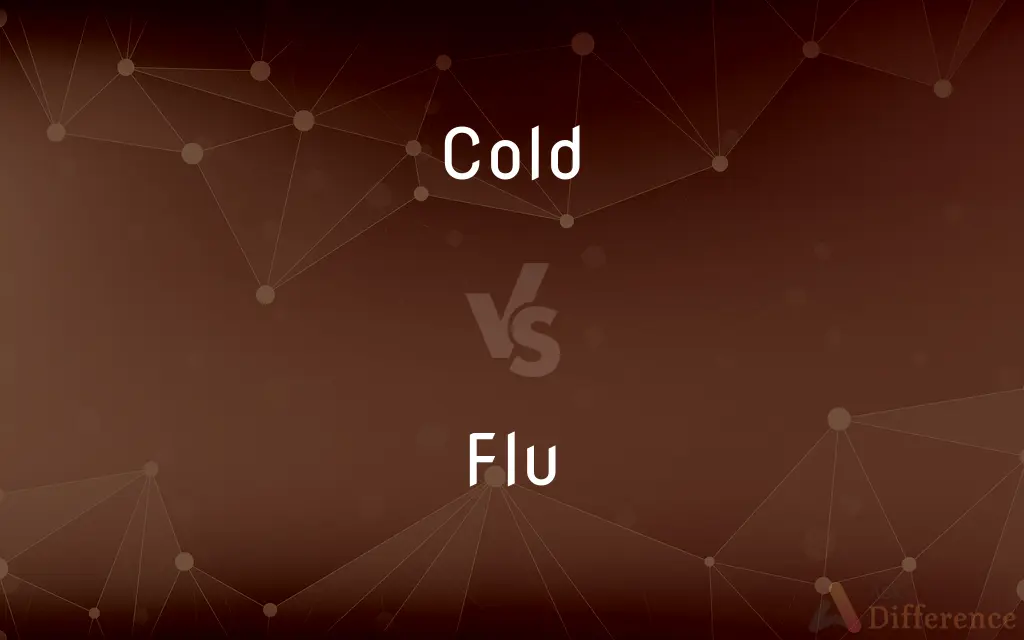Cold vs. Flu — What's the Difference?
By Urooj Arif & Maham Liaqat — Published on August 4, 2024
Colds are milder respiratory illnesses than the flu, which can result in more severe symptoms and complications.

Difference Between Cold and Flu
Table of Contents
ADVERTISEMENT
Key Differences
Colds and the flu are both respiratory illnesses but are caused by different viruses. Colds are generally milder and more likely to cause runny or stuffy noses, whereas the flu can lead to severe health complications such as pneumonia, especially in the elderly, young children, and people with certain chronic health conditions.
The onset of symptoms in a cold is usually gradual, with sufferers often experiencing a sore throat early on, followed by sneezing, runny nose, and coughing. On the other hand, flu symptoms come on quickly and can include fever, headache, muscle aches, soreness, congestion, and cough. The intensity of the flu makes it more debilitating and likely to lead to bed rest.
Colds typically do not result in serious health issues or require hospital visits, with most people recovering within a week to ten days. In contrast, the flu can have serious complications, such as pneumonia, bacterial infections, or hospitalizations, and recovery might take longer.
Prevention strategies for both include frequent handwashing, avoiding close contact with sick individuals, and maintaining a healthy lifestyle to support the immune system. Additionally, annual flu vaccinations are recommended as a key preventive measure against the flu, whereas there's no vaccine for the common cold.
While over-the-counter medications can relieve symptoms of both colds and the flu, antiviral drugs may be prescribed for the flu to reduce the severity and duration of the illness if taken shortly after symptoms begin. In contrast, treatment for colds mainly focuses on relieving symptoms and providing comfort during recovery.
ADVERTISEMENT
Comparison Chart
Cause
Caused by rhinoviruses and others.
Caused by influenza viruses.
Symptoms Onset
Gradual.
Abrupt.
Common Symptoms
Runny/stuffy nose, sore throat, cough.
Fever, headache, muscle aches, cough, congestion.
Severity
Milder than the flu.
More severe, can lead to serious complications.
Complications
Rarely leads to serious issues.
Can lead to pneumonia, hospitalization.
Prevention
Handwashing, avoiding sick people.
Annual vaccination, handwashing, healthy lifestyle.
Treatment
Symptom relief with over-the-counter meds.
Antiviral drugs (if early), symptom relief.
Compare with Definitions
Cold
A mild respiratory illness caused by several different viruses.
Rhinoviruses are common culprits of the common cold.
Flu
Include fever, cough, muscle aches, and fatigue.
Flu symptoms often appear suddenly and can be severe.
Cold
Include sneezing, runny nose, sore throat, and coughing.
Colds often start with a sore throat and progress to a runny nose.
Flu
A serious respiratory illness caused by influenza viruses.
Influenza A and B viruses cause seasonal epidemics.
Cold
Rarely lead to serious health issues.
Colds seldom require hospitalization.
Flu
Can lead to pneumonia, hospitalizations, and death.
Elderly, young children, and those with chronic diseases are at higher risk.
Cold
Symptoms typically last 7 to 10 days.
Most people recover from a cold within a week.
Flu
Symptoms can last for several weeks.
Full recovery from the flu can take up to two weeks.
Cold
Good hygiene practices like frequent handwashing.
Regularly washing hands can reduce the risk of catching a cold.
Flu
Annual vaccination is the most effective prevention.
Getting the flu shot every year helps reduce the risk of getting the flu.
Cold
The sensation produced by low temperatures;
He shivered from the cold
The cold helped clear his head
Flu
Influenza.
Cold
Having a low temperature
Cold water.
Flu
Any of several infections that affect the respiratory or gastrointestinal tract and are caused by viruses other than the influenza virus.
Cold
Being at a temperature that is less than what is required or what is normal
Cold oatmeal.
Flu
Influenza.
Catch flu
Get over the flu
Transmit flu
Cold
A viral infection characterized by inflammation of the mucous membranes lining the upper respiratory passages and usually accompanied by malaise, fever, chills, coughing, and sneezing. Also called common cold, coryza.
Flu
An acute febrile highly contagious viral disease
Cold
A condition of low temperature.
Come in, out of the cold.
Cold
(medicine) A common, usually harmless, viral illness, usually with congestion of the nasal passages and sometimes fever.
I caught a miserable cold and had to stay home for a week
Cold
A mild viral infection involving the nose and respiratory passages (but not the lungs);
Will they never find a cure for the common cold?
Common Curiosities
Can colds lead to the flu?
No, colds and the flu are caused by different viruses and one does not lead to the other.
Is it possible to have the flu without a fever?
Yes, though less common, it's possible to have flu symptoms without a fever.
Should I get a flu shot if I'm usually healthy?
Yes, the CDC recommends annual flu vaccinations for everyone aged 6 months and older to prevent flu and its complications.
Can I take antibiotics for a cold or the flu?
No, antibiotics do not work against viruses, which cause both colds and the flu. Antiviral drugs may be used for the flu.
What is the best way to prevent spreading colds and the flu?
Practice good hygiene, stay at home when sick, cover coughs and sneezes, and get vaccinated against the flu.
How can I tell if I have a cold or the flu?
The flu typically has more severe symptoms such as high fever and body aches, while colds are milder with more nasal congestion.
Can stress affect my risk of getting a cold or the flu?
Yes, high stress levels can weaken the immune system, making you more susceptible to infections.
How long is someone with the flu contagious?
People with the flu are typically contagious from 1 day before symptoms develop up to 5 to 7 days after becoming sick.
Why do colds and the flu occur more frequently in the winter?
People are indoors and in close contact more often during winter, and some viruses survive better in colder, drier climates.
What should I do if I have the flu?
Rest, stay hydrated, and consider antiviral medications if prescribed by a healthcare provider.
Can exercise help prevent colds and the flu?
Regular, moderate exercise can boost the immune system, potentially reducing the risk of respiratory illnesses.
How effective is the flu vaccine?
Effectiveness varies by year, but the flu vaccine is the best defense against flu and its complications.
What is "flu season"?
Flu season refers to the time of year when flu viruses circulate at higher levels, typically fall and winter in the United States.
Is it too late to get a flu shot if the season has already started?
No, as long as flu viruses are circulating, vaccination can still be beneficial.
Can the flu vaccine give me the flu?
No, flu vaccines cannot cause flu illness; they are made with either inactivated (killed) viruses or without any flu virus at all.
Share Your Discovery

Previous Comparison
Near Field vs. Far Field
Next Comparison
SD vs. XDAuthor Spotlight
Written by
Urooj ArifUrooj is a skilled content writer at Ask Difference, known for her exceptional ability to simplify complex topics into engaging and informative content. With a passion for research and a flair for clear, concise writing, she consistently delivers articles that resonate with our diverse audience.
Co-written by
Maham Liaqat











































